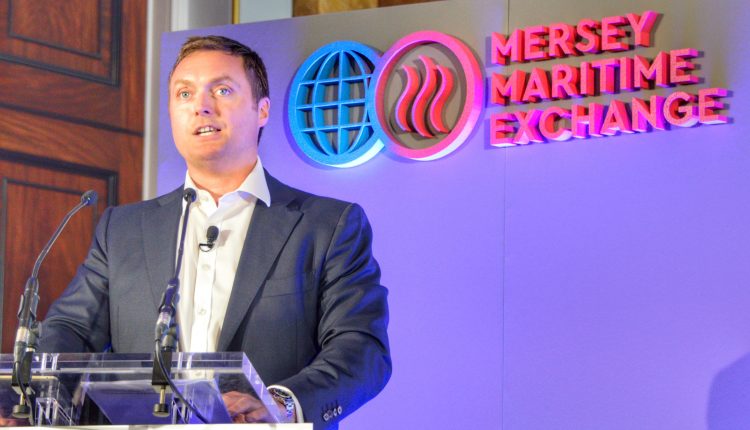
Maritime sector ‘must seize the fantastic opportunities’
Leaders of the £116bn UK maritime sector came together at Liverpool Town Hall for the Mersey Maritime Maritime Exchange conference where the future of the industry was discussed. Tony McDonough reports
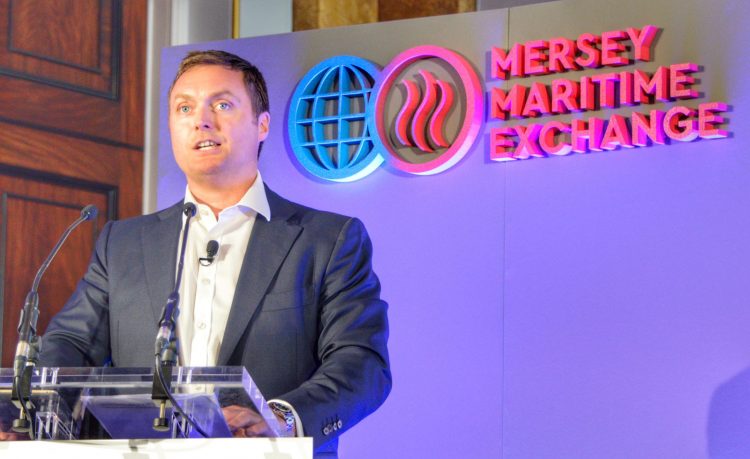
Britain’s maritime industry is ready and willing to lead the world in growth, innovation, diversity and decarbonisation in the next 30 years.
That was the clear message from national maritime industry leaders who came together at Liverpool Town Hall for the fourth annual Maritime Exchange Conference organised by regional cluster organisation Mersey Maritime and Maritime UK.
There were a number of key announcements. These included a new £2.4m fund for seafarers’ welfare, a high-level trade mission to Washington to attract investors to Liverpool City Region Freeport and a new project to enhance the connectivity of the River Mersey.
Leading lights from business, Government and academia attended the packed event. It was sponsored by Expleo, Nautilus International, Liverpool John Moores University, Royal HaskoningDHV and the Royal Navy. Its focus was the Government’s Maritime 2050 strategy which outlines the future of the sector over the next three decades.
Mersey Maritime chief executive Chris Shirling-Rooke said UK plc had “fantastic opportunity” to harness the dynamism and innovation of the UK maritime sector to become a global industry powerhouse.
And there were warnings. Collaboration was key as was the willingness to move quickly to invest and innovate. Government was urged to back up its words with real cash and regulation to protect professions such as seafarers. Above all, the message was that it was critical that people were put front and centre as the industry moves forward.
Ahead of the conference both Maritime UK and Mersey Maritime published up-to-date analysis which detailed how maritime was now worth £116bn to the UK economy each year. In Liverpool city region the industry was valued at £5bn – this is 20% higher than previous estimates. Across Merseyside it supports more than 48,000 jobs.
Maritime Minister Robert Courts delivered the opening address of the conference via video link. He said maritime was “the engine that sustains the country and drives its economic growth”.
Maritime, he added, had risen to “the biggest challenge it had ever faced” in the shape of the COVID-19 pandemic, describing the industry’s response as “magnificent”. Mr Courts said: “Despite this challenge goods continued to flow.”
He announced a £2.4m package to support the welfare of seafarers and said the Government was launching a new “recovery route map”, setting out the actions to help the sector recover from the effects of the pandemic.
“We must never forget that people are the lifeblood of the maritime sector,” said Mr Courts. “We need the right people in the right jobs with the right skills. Now is the time to be ambitious.”
Mr Courts also referred to the nine-point plan published by the Government in March which sought to bring in greater protections for seafarers. This was in response to P&O Ferries’ decision to sack 800 workers.
However, later on during the conference, Mr Courts was taken to task by Mark Dickinson, general secretary of the seafarers union, Nautilus International. Mr Dickinson said the Government’s proposals to protect workers did not go far enough.
He said P&O’s actions had “blown a hole” in the Government’s strategy for the UK maritime industry. And he urged the Government to avoid a “race to the bottom” when it comes to seafarer pay and conditions.
“Maritime 2050 is a strategy we fully support and are partners in. But P&O has put Maritime 2050 in serious peril by putting young people off a career in maritime. It has turbo-charged a race to the bottom in terms of pay and conditions of seafarers.”
Following Mr Courts was Victoria Race, deputy director of maritime policy at the Department for Transport. She spoke of the “near universal support” for the Maritime 2050 strategy across the industry.
She said industry efforts focusing on decarbonisation, skills and diversity, and innovation and tech would boost not only the UK economy as a whole but would also boost the regeneration of our coastal communities.
“We need to retain our competitive advantage,” she added. “It is fantastic work that is done by regional clusters. We don’t always realise how valuable they are.”
Following the initial speeches the conference then offered a series of panel discussions. Topics were the environment, people and skills, regional growth and technology and innovation.
These panels also yielded major announcements of their own. During the discussion on regional growth, Liverpool City Region Freeport director John Lucy revealed interest from potential global investors into the freeport had been “phenomenal”.
On the back of this he revealed there would be a top level trade mission to Washington DC later this year in conjunction with Mersey Maritime. He added: “Liverpool city region is going to be leading the race to attract international investors.”
In another exciting announcement, Thomas White, head of maritime & ports at the Connected Places Catapult, revealed a new project in partnership with Mersey Maritime and leading consultancy Royal Haskoning DHV.
He outlined a “a vision of our renewed connectivity through waterways in UK regions” with the Moving on the Mersey project focused on the River Mersey. Its aim is to find ways of making better use of the River Mersey for freight, tourists and commuters.
And, during the panel on people and skills, Gary Jeffreys from shipping giant Maersk, said it intended to create more than 4,000 jobs by 2025 as part of its transformation into an end-to-end logistics business. The company currently employs 300 people at its Liverpool city centre base.
“We need to ensure we have a diverse workforce to manage this transformation,” he said. “Maersk is committed to diversity and we need to recruit people from all sections of the community to come to work for us.”
During the discussion on the environment, Kevin Brown, commercial and contracts leader at Bibby Marine, outlined its ambitions to create zero carbon offshore support vessels. Bibby Line Group is one of Liverpool’s oldest businesses and its focus is very much on decarbonisation.
Its WaveMaster Zero C project is a collaboration that includes MarRI-UK, shipbuilder Damen and Lloyds Register. It had secured some development funding from the Government. Mr Brown said more support would be needed if the company was to build a prototype.
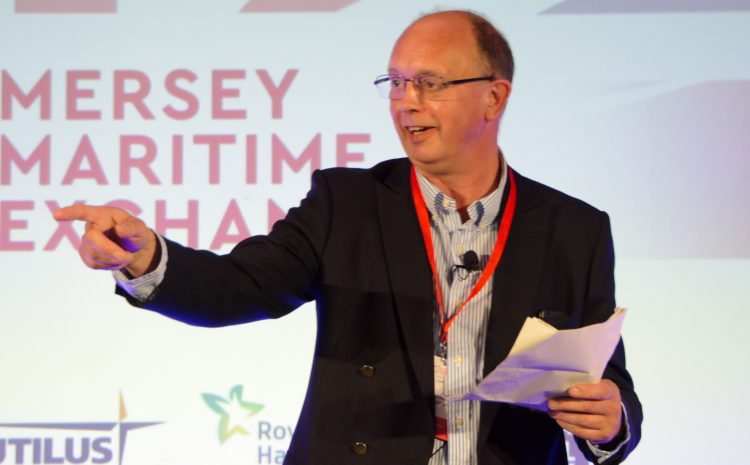
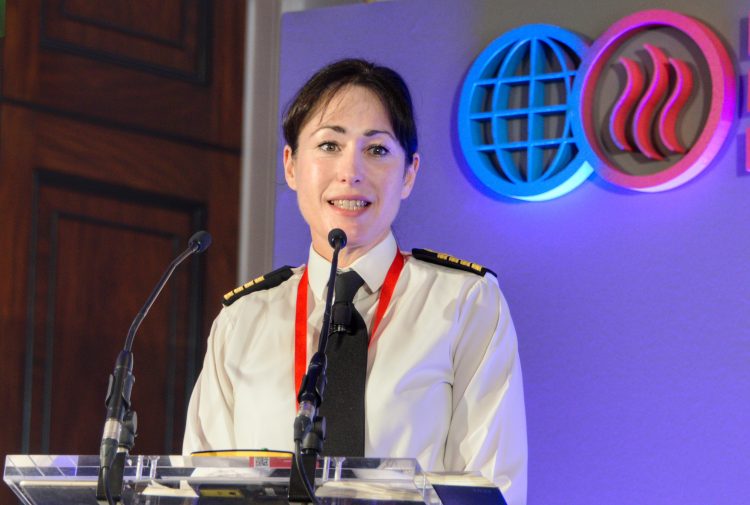
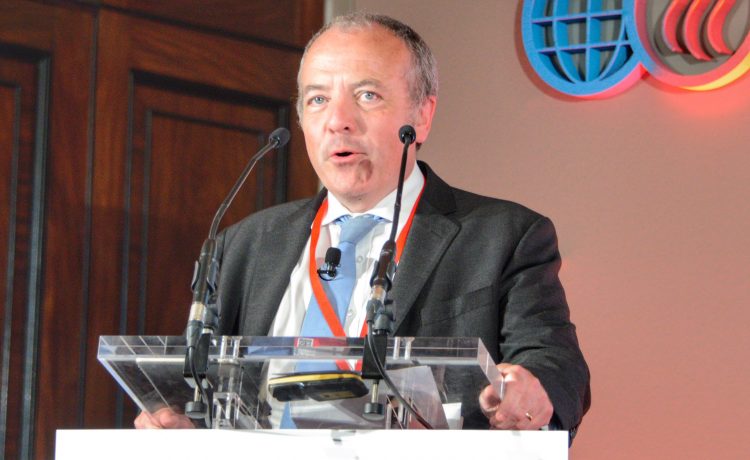
This point was hammered home at the end of the conference in an impassioned speech by Sir Michael Bibby, chairman of Bibby Line Group. He said: “I’m a great believer in competition. It forces companies to define their USP and show they can provide something that is different and better than their competitors.
“If you can add more value then you will be successful. We can produce a zero carbon ship in two years – but it is going to cost money. And we need to get on with it. If we don’t the rest of the world will and they will just sail away without us.
“We can be competitive but unless we get the seed funding then nothing will happen. We can’t afford to wait six or 12 months. We need to be the leaders in this technology and we need to do it now.”
Other panel speakers include “It is a strategy we fully support and are partners in. But P&O has put Maritime 2050 in serious peril but putting young people off a career in maritime. It has turbo-charged a race to the bottom in terms of pay and conditions of seafarers.”
Another panel speaker was Captain Rachael Smallwood, head of human performance – Royal Navy. She talked about the major culture shift within Britain’s senior service that had shifted the focus from being “task-based to becoming people-oriented”.
This, she explained, had resulted in a transformational effect on the performance and capability among people at all levels of the Royal Navy. She added: “We have created an environment which allows people to thrive. People are now more physically and psychologically resilient.”
Labour MP Mike Kane, Shadow Maritime Minister, concluded the conference with his address to delegates. He welcomed the introduction of the city region Freeport and rejected the idea that it will just displace jobs and investment from elsewhere.
“I am the MP for the area covering Manchester Airport and about eight years ago the Government announced Airport City which offered tax exemptions,” said Mr Kane.
“I have seen 10,000 jobs coming to my constituency with big logistics companies coming to that site. There are benefits to accrue from this and we really have to make sure this happens. Freeports won’t displace jobs. These were new jobs that were created.”
Mr Kane said there will still be challenges for the north in terms of investment and connectivity. He referred to Daniel Adamson, the 19th century engineer and industrialist who was the driving force behind the Manchester Ship Canal.
Opening in 1885, the canal provided a link from the Mersey Estuary to Port Salford, which is still heavily used today. Adamson, said Mr Kane, was a visionary who came up with the concept of a Northern Powerhouse more than a century after it became a political policy.
“He envisaged a Northern region from the Mersey Estuary to the Humber Estuary,” added Mr Kane. “We want to see better east-west connections as north-south. HS2 is great for my constituency.
“But the whole region isn’t going to benefit from that. We still have challenges here in the north with railways, with capacity, with freight, with logistics. And it is about building that northern capacity that Daniel Adamson talked about 150 years ago.”
Mr Kane offered his thanks to the maritime sector for its efforts in keeping the UK supplied during the pandemic. He said: “I want to thank you all for keeping us fueled and fed during the pandemic – you were extraordinarily brave and innovative.”
